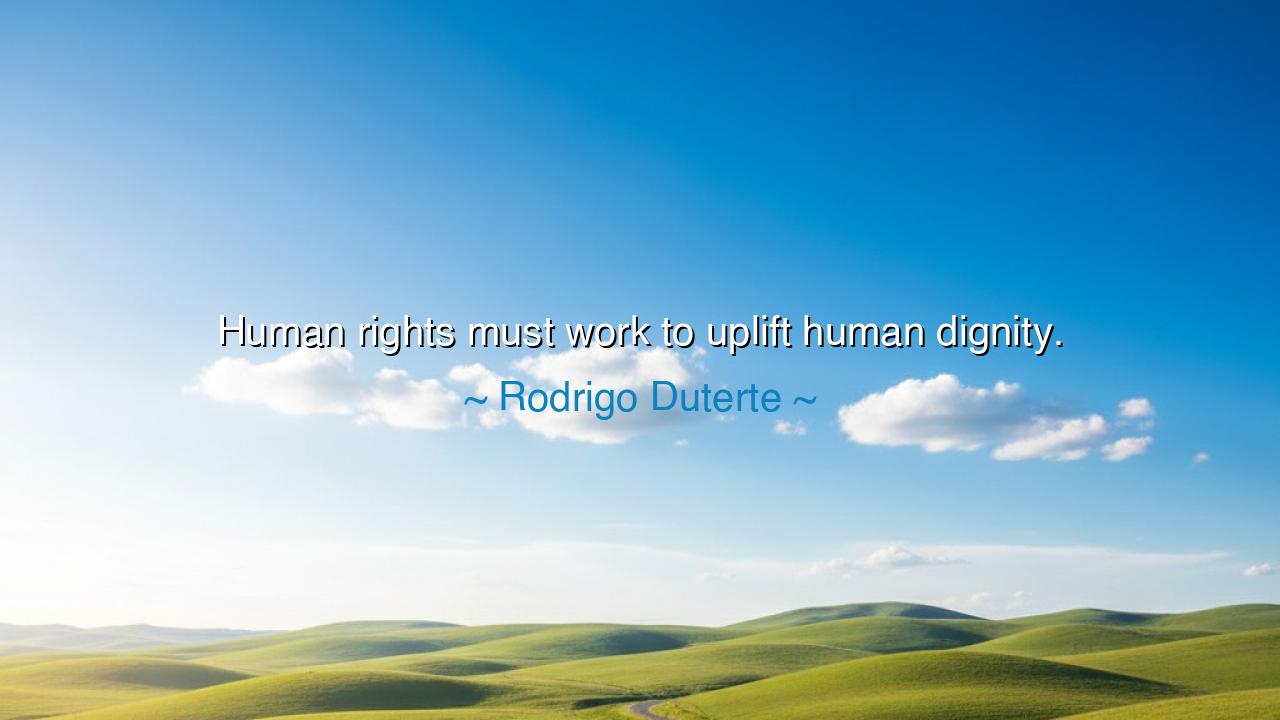
Human rights must work to uplift human dignity.






In the voice of command, “Human rights must work to uplift human dignity.” Thus spoke Rodrigo Duterte, a ruler whose words stirred both fervor and controversy. His saying unveils a truth older than law itself: that the purpose of human rights is not mere parchment or decree, but the raising of the human spirit, the guarding of the worth of every soul. For rights without dignity are empty, like a vessel without water.
The meaning is that rights are not ends in themselves, but instruments to protect the sacred essence of humanity. To uplift human dignity is to ensure that no person is reduced to mere object, no life dismissed as expendable. Justice, then, is measured not by the abundance of laws written, but by how those laws shelter the weak, honor the strong, and bind all in respect.
This teaching arises from the struggles of governance, where leaders wrestle with order and freedom, with authority and compassion. In speaking of dignity, Duterte points to the heart of all governance: that the worth of a nation is found not in power or wealth, but in how it honors its people. When human rights fail to lift the lowly, they have lost their purpose.
To future generations, the wisdom is clear: rights are not treasures locked in books, but living forces meant to raise the human condition. Wherever dignity is denied, rights must be awakened to restore it. For the greatness of any people is found not in conquest or dominion, but in how faithfully they guard the light within every human being.






BHTa Nu Bich Hue
Duterte's statement on human rights and dignity is compelling, but it also brings up some uncomfortable truths. In many parts of the world, even with human rights protections in place, people still suffer from indignity and oppression. Can human rights efforts be more than just legal frameworks? How do we truly address the deep-rooted cultural and societal factors that often strip people of their dignity, and is it enough just to legislate change?
MDhoang mai dieu
Rodrigo Duterte’s quote about human rights is powerful, but it also makes me question how we measure the effectiveness of human rights initiatives. If human rights are supposed to elevate dignity, how do we ensure that they don’t just become legal jargon or political tools? What does it mean for human dignity to be truly uplifted—does it require social, economic, and cultural changes in addition to legal protections?
DHDoan Thi Thu Diem Huong
This quote by Duterte raises an important point about the connection between human rights and dignity. But is it possible for human rights to truly uplift dignity in places where people are oppressed or in poverty? Can we achieve the true spirit of human rights by addressing the root causes of inequality, or do we only treat the symptoms? How do we create systemic change that honors human dignity on a larger scale?
NMNguyen My
I agree with Duterte’s idea that human rights should aim to uplift human dignity. However, I wonder if this goal is always realized in practice. While human rights are intended to protect dignity, we see many instances where they are violated or overlooked. How can governments and institutions ensure that human rights laws don’t just exist on paper but actively improve people’s lives, especially the marginalized?
PTHoang Phuong Thao
Rodrigo Duterte’s statement about human rights is quite thought-provoking. It brings to light the essential role that human rights play in maintaining human dignity. But can human rights always be effectively enforced in every society? How do we ensure that the policies designed to protect rights truly uplift people’s dignity, especially in areas where systemic inequalities and corruption exist? Can human rights laws be enough to create real societal change?